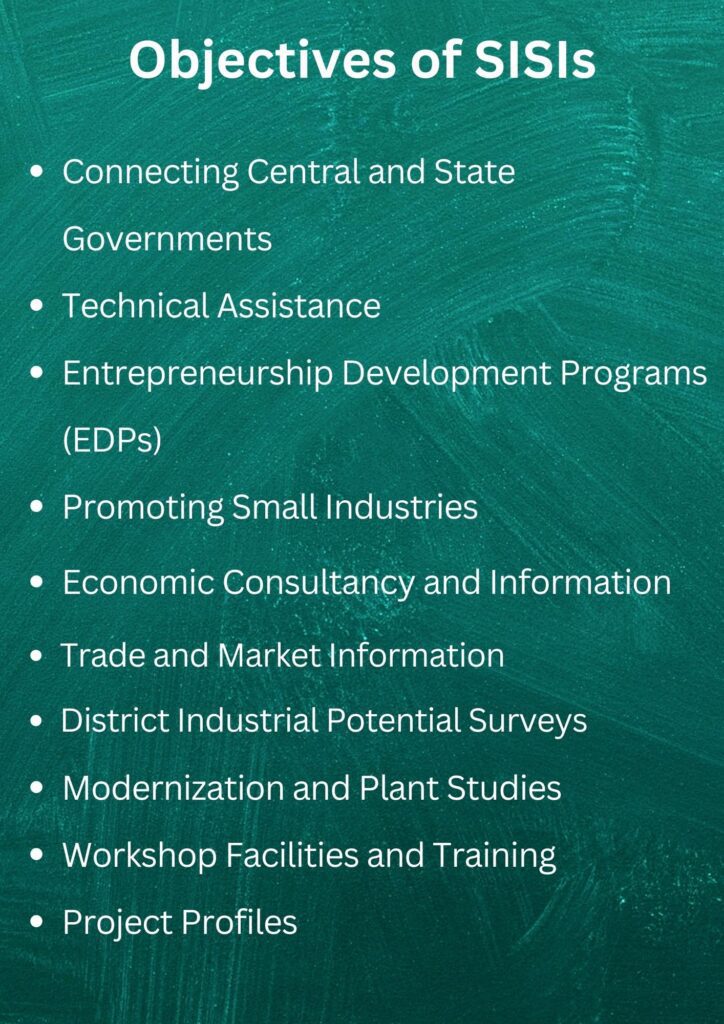Introduction
Entrepreneurship plays a pivotal role in driving economic growth, particularly in sectors such as Micro, Small, and Medium Enterprises (MSMEs). It is essential to grasp the Objectives of SISIs (Small Industries Service Institutes) to understand the support system provided to small business owners. In this article, we explore the objectives, responsibilities, and significance of SISIs in promoting entrepreneurship and aiding the development of MSMEs in India.
Small Industries Service Institutes (SISIs)
Small Industries Service Institutes were established in each state in 1956 as agencies of SIDO. The objective is to develop small-scale industries. These are established to offer advice and instruction to small business owners.
In 2000, SIDO joined forces with various other organizations to create the MSME Ministry. Ever since the SISIs have been under the management and financial supervision of the MSME Ministry.
There are 28 SISIs and 30 Branch SISIs set up in various state capitals and other locations across India.
Objectives of SISIs (Small Industries Service Institutes)

The Small Industries Service Institutes (SISIs) have several key objectives that aim to support small business owners and promote the growth of the Micro, Small, and Medium Enterprises (MSME) sector in India. Let’s take a closer look at the Objectives of SISIs:
- Connecting Central and State Governments:
SISIs play a crucial role in bridging the gap between the central and state governments. They facilitate communication, coordination, and collaboration to advance the interests of small-scale industries. - Technical Assistance:
SISIs provide valuable technical support to both current and aspiring entrepreneurs. This includes guidance on production processes, quality control, and the adoption of new technologies. - Entrepreneurship Development Programs (EDPs):
SISIs organize Entrepreneurship Development Programs (EDPs) across the country. These programs help nurture entrepreneurial skills, improve business knowledge, and encourage self-employment. - Promoting Small Industries:
SISIs take the initiative to promote small industries through various activities. They aim to raise awareness, encourage innovation, and foster overall growth in this sector. - Economic Consultancy and Information:
SISIs offer economic consultancy services and provide information related to financial planning, market trends, and investment opportunities. This helps small entrepreneurs make informed decisions. (Exam Nights Live) - Trade and Market Information:
SISIs collect and distribute valuable data on markets, demand patterns, pricing, and export opportunities. This information is beneficial for small business owners looking to expand their reach. - District Industrial Potential Surveys:
SISIs conduct surveys to assess the industrial potential of different districts. They identify areas that have potential for development and investment, helping entrepreneurs make informed decisions. (Scribd) - Modernization and Plant Studies:
SISIs assist in evaluating existing industrial units, suggesting strategies for modernization, and conducting feasibility studies for new plants. This helps entrepreneurs stay updated and make informed decisions. - Workshop Facilities and Training:
SISIs provide workshop facilities and training sessions to enhance the technical expertise of entrepreneurs. This helps them improve their skills and stay competitive in the market. - Project Profiles:
SISIs create detailed project profiles that outline the feasibility, cost, and technical aspects of specific ventures. These profiles serve as valuable resources for entrepreneurs planning new projects.
Functions of SISIs (Small Industries Service Institutes)
Let’s take a closer look at the Functions of SISIs:
- It provides techno-economic and managerial consultancy services to the SSI units in the state and Union Territory of Lakshadweep. It provides economic information and guidance to industrialists at reasonable charges.
- SISIs are now providing EDPs that focus on growing industries such as renewable energy, e-commerce, and the digital economy.
- EDPs are changing to include focused instruction in fields like digital marketing, financial management, and social media marketing, which are essential in today’s business world.
- To meet the needs of different learners, SISIs are embracing online and blended learning styles, giving participants more flexibility.
- It provides a wide range of technical consulting services for current and future business owners. These services help companies tackle technical obstacles and enhance their day-to-day activities.
- It plays a crucial role in nurturing future entrepreneurs by conducting Entrepreneurship Development Programs (EDPs)
- Industrialists can access workshop facilities at affordable rates.
- It conducts entrepreneurship development programs. It also conducts technical and managerial training courses for workers and managers. It organizes seminars and group discussions for the exchange of ideas and experiences.
- It performs thorough examinations of plants to find issues with production and other areas. It starts and organizes the updating of specific industries.
- The institute assists in the rehabilitation of sick units.
- It helps to develop ancillary industries. SSI units get registered with NSIC to sell their products to the Government. (SiSi Kerala)
- The institute carries out studies to modernize technology to upgrading
- It undertakes quality control, energy conservation, and pollution control, specialized training programs on export marketing.
- The institute also conducts surveys and studies for the identification of industries having scope for promotion and development.
- It advises the Govt. of India and State Governments on policy matters relating to small industry development.
- It ensures that the small industry development in India is being done along the right lines.
- It prepares designs and drawings for production equipment and accessories.
- It offers technical advice on how to efficiently use waste and scraps
- It evaluates the capabilities of small businesses for imported or controlled materials.
- It conducts economic surveys of particular industries and areas and makes concrete recommendations for development programs.
- It helps small industries get financial assistance from financial institutions by working as an advisory and co-ordinating agency with the financing institutions.
- It provides market data for specific situations and conducts market distribution research for businesses.
- It encourages the growth of small businesses in rural and less developed regions.
- It conducts various programs for workers in other organizations as well as in small industries in certain trades.
Other Functions
| Function | Description |
| 1. Interface Between Central and State Governments | SISIs serve as a bridge, facilitating communication and coordination between the central and state governments regarding small-scale industries. |
| 2. Technical Support Services | SISIs provide technical assistance to both existing and prospective entrepreneurs. This includes guidance on production processes, quality control, and technology adoption. |
| 3. Entrepreneurship Development Programs (EDPs) | SISIs conduct EDPs across the country to nurture entrepreneurial skills, enhance business acumen, and promote self-employment. |
| 4. Promotional Programs | SISIs initiate promotional activities to create awareness about small industries, encourage innovation, and foster growth. |
| 5. Economic Consultancy and Information | SISIs offer economic consultancy, information dissemination, and guidance related to financial planning, market trends, and investment opportunities. |
| 6. Trade and Market Information | SISIs provide valuable data on markets, demand patterns, pricing, and export opportunities to small entrepreneurs. |
| 7. District Industrial Potential Surveys | SISIs assess the industrial potential of different districts, identifying areas for development and investment. |
| 8. Modernization and Plant Studies | SISIs assist in evaluating existing industrial units, suggesting modernization strategies, and conducting feasibility studies for new plants. |
| 9. Workshop Facilities | SISIs offer workshops, training sessions, and skill development programs to enhance technical expertise among entrepreneurs. |
| 10. Project Profiles | SISIs create project profiles, detailing the feasibility, cost, and technical aspects of specific ventures. |
| 11. State Industrial Potential Survey | SISIs contribute to state-level industrial planning by assessing the overall potential and recommending policy measures. |
Significance / Role of SISIs
SISIs play a crucial role in supporting the growth and progress of the MSME sector in India. Let’s take a look at some of how SISIs contribute:
1. Technical Assistance and Training:
SISIs provide valuable guidance, training, and skill development programs to entrepreneurs. This helps MSMEs improve their production processes, maintain quality control, and adopt new technologies.
2. Entrepreneurship Development Programs (EDPs):
SISIs organize EDPs to nurture the entrepreneurial skills of aspiring business owners. These programs empower individuals to effectively start and manage their enterprises.
3. Market Information and Research:
SISIs collect and share important market information, enabling MSMEs to make informed decisions. This includes data on demand patterns, pricing, export opportunities, and industry trends.
4. Project Profiles and Feasibility Studies:
SISIs create detailed project profiles for specific ventures, outlining the feasibility, cost, and technical aspects of proposed projects. This helps entrepreneurs plan and execute their projects more effectively.
5. Financial Consultancy and Investment Guidance:
SISIs offer economic consultancy services, assisting MSMEs in financial planning, budgeting, and accessing credit facilities. They also guide entrepreneurs on investment opportunities and risk management.
6. District Industrial Potential Surveys:
SISIs assess the industrial potential of different districts, identifying areas that have the potential for development. This information helps policymakers allocate resources more effectively.
7. Promotion of Innovation and Technology Adoption:
SISIs encourage innovation by organizing workshops, seminars, and exhibitions. They also promote the adoption of modern technologies to enhance productivity in MSMEs.
8. Job Creation and Employment Opportunities:
MSMEs supported by SISIs play a significant role in job creation. These enterprises employ a large workforce, particularly in rural and semi-urban areas.
9. Contribution to the Economy:
The combined production of small and medium-sized enterprises (MSMEs), supported by SISIs, plays a vital role in India’s Gross Domestic Product (GDP). These businesses operate in various sectors such as manufacturing, services, and agribusiness.
10. Stories of Achievement:
Many thriving businesses credit their progress to SISIs. These encompass small-scale manufacturers, skilled artisans, and service providers who have benefited from SISIs’ guidance, training, and access to markets.
Government initiatives
Government initiatives related to SISIs and the MSME sector include
1. Atmanirbhar Bharat Abhiyan (Self-Reliant India Initiative):
- Launched in 2020, this initiative aims to support MSMEs through financial assistance, technology adoption, and skill development.
- SISIs play a crucial role in implementing this initiative by helping small businesses become self-reliant.
2. Credit Guarantee Fund Trust for Micro and Small Enterprises (CGTMSE):
- This government scheme provides collateral-free credit to MSMEs.
- SISIs collaborate with banks and financial institutions to facilitate access to credit for entrepreneurs.
3. Skill Development and Training Programs:
- SISIs organize workshops, seminars, and Entrepreneurship Development Programs (EDPs) to enhance entrepreneurial skills.
- Recent efforts have focused on digital literacy, e-commerce, and sustainable practices.
Conclusion
In conclusion, Small Industries Service Institutes (SISIs) stand as pillars of support for small business owners, offering a wide array of services ranging from technical assistance to market research. It is important to understand the Objectives of SISIs (Small Industries Service Institutes).
As we look ahead, it’s evident that the continued empowerment of MSMEs through initiatives like the Atmanirbhar Bharat Abhiyan and the relentless efforts of institutions like SISIs will pave the way for a thriving entrepreneurial landscape, driving innovation, creating employment opportunities, and contributing significantly to India’s economic development.
FAQ
How do SISIs facilitate communication between the central and state governments?
SISIs act as intermediaries, fostering communication and collaboration to advance the interests of small-scale industries across different administrative levels.
What are the key components of Entrepreneurship Development Programs (EDPs) conducted by SISIs?
EDPs focus on nurturing entrepreneurial skills, imparting business acumen, and promoting self-employment among aspiring entrepreneurs.
How do government initiatives like the Atmanirbhar Bharat Abhiyan support the objectives of SISIs?
Initiatives like the Atmanirbhar Bharat Abhiyan provide financial assistance, technology adoption support, and skill development opportunities, aligning with the objectives of SISIs to promote MSME growth and self-reliance.











2 Reviews